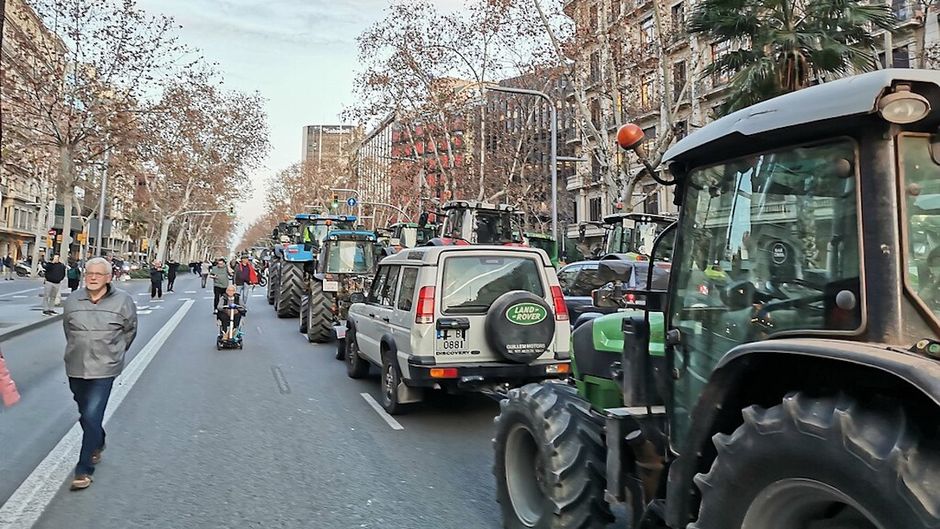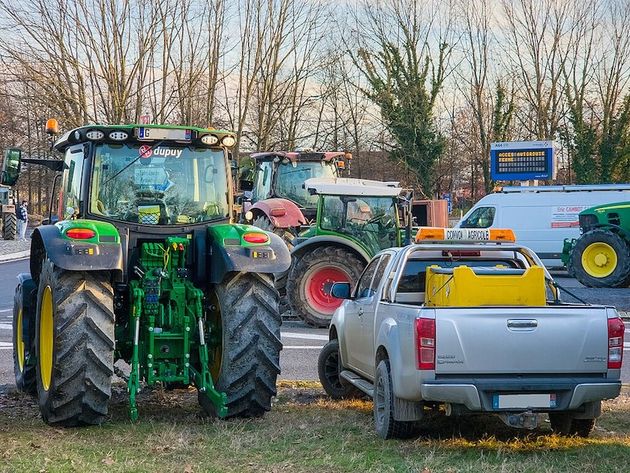Agricultural crisis: ‘A Christian farmer knows that you don’t just throw the seeds in and that’s it’
Evangelicals analyse the agricultural crisis that has mobilised thousands of farmers across Europe with tractor demonstrations and product boycotts.
Protestante Digital · BARCELONA · 21 FEBRUARY 2024 · 12:55 CET

Tractors blocking some of the main roads, or farmers buying imported food and then destroying it at the doors of the same supermarket, are some of the images of the mobilisation of agricultural workers in Spain.
“The demands go further back”, says Josué Luis Sotillo, an evangelical and mayor of Saelices de la Sal, a town in the province of Guadalajara, who knows rural areas well.
One of the issues on the table is the unease caused by excessive bureaucracy that takes up hours and hours of work. Increasingly demanding EU regulations and the slow rythm at which aids arrive to the sector are other factors that have caused the protests.
“There is a big contrast between the conditions demanded by the European Union for production and those of producers in other non-EU countries, from which we are importing more and more food”, Sotillo told Spanish news website Protestante Digital.
The Spanish government, as in other European countries, has said it will meet with representatives of some of the agricultural organisations behind the demonstrations.
Consumption and ethics from a biblical perspective
With slogans such as “no farmers, no food”, producers address not only the government, but also the general public.
Christian geographer Michael Wickham acknowledges that “there seems to be little that can be done for the majority of us who live in big cities”.
But he believes that “we can start by consuming less meat and processed products, using water more rationally, in short, trying not to let our lives be so manipulated and controlled by the current systems of production and consumption”.
For Sotillo, “the world in which we live seems more a human creation [than a divine one]. For the Biblical characters, the world created by God worked in a different way, and so does Christian life”.
“An evangelical experienced in growing crops knows that you don't just throw the seeds in and that's it, if you want them to take root and sprout you may have to spend some time and effort preparing the soil. A shepherd familiar with animal care knows that every sheep is special. And if you are a market gardener, you know that tender plants require daily care until they develop and become strong”.
Moreover, continued José Luis Sotillo, “the preacher who is familiar with the home fire knows that lighting the fire every day is not easy, so when he preaches, the important thing is that the Word of God ignites and begins to burn in the hearts of his listeners”.
“Living in contact with nature opens up other perspectives and also changes the way we interact with God”, adds Sotillo.

The increase in imports
One of the main causes of the unease of agricultural producers is the issue of imports.
In Spain, 40% of fruit and vegetables come from abroad, “at low prices" and “not complying with internal European Union regulations", denounced the main agricultural associations in Spain, in a joint statement.
Wickham explains that Spain has gone from being “an exporter of vegetables to a country where we import many products because they are cheaper”.
That is why Spanish producers call on the government and the European Community to limit the free trade agreements, which encourage such inflows of foreign products into a country known for years for having the “garden of Europe”.
“We are often offered what is best for the big distributors, who are the big speculators. The consumer also has a voice here. He should be trained to make a decision, but in many cases they they don't care where a product comes from and the process it has undergone”, stresses Sotillo.
The CAP and the lack of agreements
Spanish farmers see the CAP (Common Agricultural Policies of the European Union) as rigid and unwieldy, so they are calling for “flexibility and simplification“ in the face of “excessive bureaucracy“ in accessing economic aid.
“The CAP was established in the early years of the EU to ensure that the agricultural sector in each country remained competitive, with very expensive subsidies, avoiding depopulation and dependence on overseas countries”, says Wickham. But “it led to huge costs and subsidies that became a big problem for the EU”.
The national agricultural production sectors in the EU are divided. One example is the demonstrations in Germany at the beginning of 2024, and the boycott by French farmers of products from Spain and Italy, whom they accuse of using different types of fertilisers and cheaper production models than theirs.
For Sotillo, part of the problem has to do with the fact that governments look for solutions “in offices and technical departments”, which propose “very sound projects based on theoretical assumptions, which are usually very far from reality because there is a great lack of knowledge about rural life”.
“But there is also a need for a change in the general mindset about what rural life is, because for many it still has a pejorative meaning, a life with great shortcomings and very little appeal”, he adds.
The drought
The drought in Spain this year has worsened the situation. The work of irrigation producers is completely interrupted until it rains, and some have denounced the slowness in receiving the aid promised by the government.
“Everything suggests that they are starting to take action too late and the financial resources to solve the current situation of the farmers are not available”, laments Michael Wickham.
One more year
Learn all about our #OneMoreYearEF campaign here (English).
Published in: Evangelical Focus - europe - Agricultural crisis: ‘A Christian farmer knows that you don’t just throw the seeds in and that’s it’
